The Main Trends in Language Criticism in the Czech Lands during the Enlightenment (1750–1800): Institutional Preconditions and Medialization in the Scholarly and Critical Environment
The Main Trends in Language Criticism in the Czech Lands during the Enlightenment (1750–1800): Institutional Preconditions and Medialization in the Scholarly and Critical Environment
Author(s): Václav Petrbok, Ondřej PodavkaSubject(s): Historical Linguistics, Comparative Linguistics, Western Slavic Languages, 18th Century
Published by: AV ČR - Akademie věd České republiky - Ústav pro českou literaturu
Keywords: language criticism; 1750–1800; Czech; German; Latin; taste; Karl Heinrich Seibt; Josef Dobrovský; patriotism; Bohemian Lands;
Summary/Abstract: The aim of this paper is to describe 18th century “language criticism” (Sprachkritik) in the Bohemian Lands and underline its role within the process of establishing of the literary criticism. In the Habsburg monarchy, the language criticism can be traced back to the late 1740s; its origins are linked to the southern German sense of cultural (and thus linguistic), political and economical backwardness and to the efforts to catch up with the mostly protestant countries of Central and Northern Germany. The authors of this article examine not only reflections of used language and style in particular works, but also the position, prestige and function of various languages (German, Latin, Czech) themselves. The trends in language criticism and ‒ in the narrower sense ‒ language cultivation are examined with the use of both expert contributions to learned discussions and publicist articles in critical journals aiming at a larger audience. In the whole process, several moments that meant a significant impulse for language criticism can be observed. The first one would be the appointment of Karl Heinrich Seibt as university professor of Schöne Wissenschaften (belles lettres), rhetoric, historia litteraria and ethics in 1763, followed by the efforts to establish a learned society, Josephine reforms and foundation of a chair of Czech language and literature at Prague university in 1791. Finally, the tightening of censorship from the second half of 1790s on had a considerable influence on criticism; its subject started to change and it began to focus on a different group of intended readers: while it used to try to educate potential future authors, afterwards it concentrated more and more on educating of the “common reader” and engaging him into critical reflections on belles lettres.
Journal: Cornova
- Issue Year: 09/2019
- Issue No: 01
- Page Range: 35-71
- Page Count: 37
- Language: English

